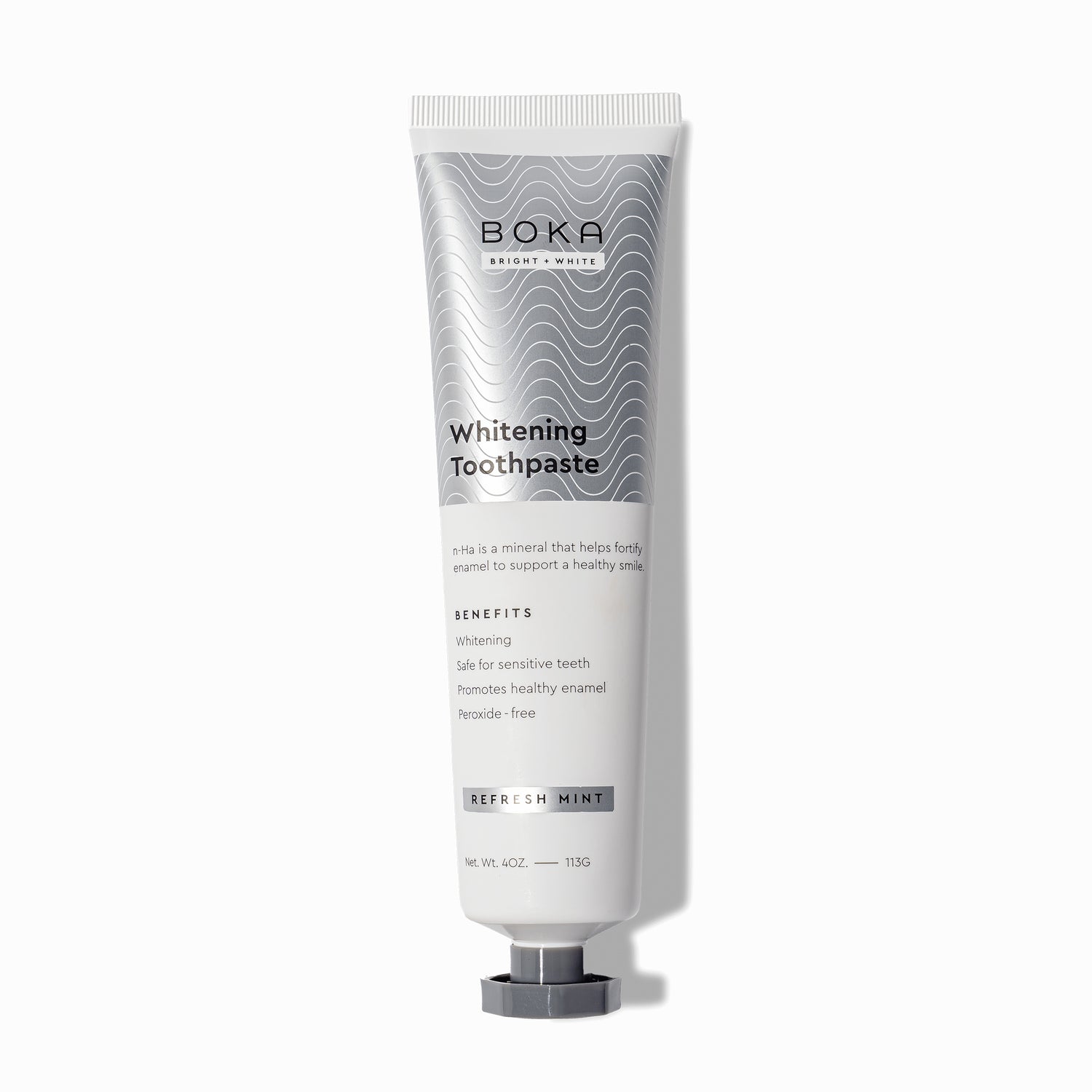You’ve been brushing your teeth regularly, but are still finding yourself with that lingering, bad taste in your mouth!
If you’re finding yourself in that position one too many times, there are some things you can do to combat this so you won’t be left with a bad aftertaste.
In this article, we will cover exactly how you can get rid of that bad taste in your mouth that lingers even after brushing your teeth.
Read on to find out what you can do, in 8 easy-to-follow, practical steps – let’s get right into it!
1. Brush your teeth and tongue twice a day
Let’s start with the obvious: the best way to not only protect your teeth but to ensure that the plaque-building bacteria that cause your bad breath do not build up is to brush your teeth twice a day!
The American Dental Association (ADA) recommends brushing your teeth twice a day, in the morning and evening, with a soft-bristled brush.
Certain toothpaste with ingredients such as xylitol have the ability to remove the odor-causing bacteria and ensure you are not left with a bad taste in your mouth even after you brush your teeth.
When you brush your teeth, it is also important that you do not forget to brush your tongue.
The surface of your tongue can harbor bacteria, food particles, and dead cells. Brushing your tongue helps remove these substances, reducing the number of bacteria in your mouth and lowering the risk of bad breath, for example.
2. Rinse your mouth thoroughly
After you eat, small food particles can linger in your teeth long after you’ve finished eating.
This allows the odor-causing bacteria in your mouth to feed on these food particles and begin to multiply – leaving you with an unpleasant taste in your mouth!
Rinsing your mouth out with water can help flush away these food particles and prevent this from happening.
Sometimes, the food that is left in our mouth can also disrupt our mouth’s natural pH balance.
Rinsing your mouth can help neutralize any acids or alkaline foods that may be contributing to a bad taste.
Alternatively, rinsing your mouth can help keep your gums hydrating, which can alleviate the bad taste caused by dryness.
Excusing yourself to quickly rinse your mouth out with water after eating food or drinking can be all it takes to get that pesky bad taste out of your mouth!
3. Use mouthwash
If you’ve been diligently brushing your teeth twice a day, using mouthwash during the day may be the best way to quickly get a bad taste out of your mouth.
Mouthwash helps to get rid of odor-causing bacteria that can leave you with a bad aftertaste.
Mouthwashes are liquid, aqueous compositions mainly intended to prevent, relieve, and cure oral conditions such as: dental caries, dental erosion, halitosis, gingivitis, periodontitis, mucositis, to reduce the oral microbiota, etc… and maintain oral health.
It can also help get rid of any food particles that may be stuck in your teeth and subsequently cause bad breath.
There are many mouthwashes available on the market, as well as mouthwash tablets which allow you to discreetly use mouthwash when you are on the go!
These tablets can also be saliva-activated and chewed to form a mouthwash substance in your mouth before being spat out, meaning they do not require water.
Some mouthwashes are also formulated to balance the mouth’s natural biome, meaning that the bacteria that cause a bad taste are removed while protecting the beneficial biome that is present on our teeth and gums.
3. Floss once a day
We understand flossing is not high on the list of favorite daily tasks for everyone.
However, it is still one of the most important things you can do if you are experiencing bad-smelling breath or an unpleasant taste even after having brushed your teeth!
Flossing has the benefit of reaching the areas between teeth and along the gum line where toothbrushes often can't reach.
This gets rid of any trapped food particles that can contribute to a bad taste in your mouth.
Daily flossing can also remove any plaque buildup between teeth and along the gum line that can harbor bacteria that contribute to bad breath and a bad taste.
Flavored tooth floss also works together with toothpaste to make sure that even the hard-to-reach areas in your mouth are left smelling fresh!
4. Stay hydrated
When people think of ways to get rid of that unpleasant taste in their mouth, they often do not think of hydration as a potential cause.
However, being adequately hydrated ensures that our bodies are producing enough saliva that plays a crucial role in washing away food particles, bacteria, and dead cells that might cause an unpleasant taste!
Drinking plenty of water helps keep the mouth moist and encourages saliva production which aids in cleansing the mouth and maintaining a more pleasant taste.
The water also naturally aids in flushing the mouth out of any lingering food particles, which can contribute to unpleasant tastes.
A study published in the International Journal of Dental Hygiene showed that drinking or rinsing with water can help reduce bad breath; it’s worth keeping in mind that water is merely one way of overcoming bad breath. Good oral hygiene is also important because water can only wash away so much.
5. Avoid certain foods
Certain foods will most definitely leave a bad taste in your mouth, which can linger long after we have brushed our teeth.
Some of the most common culprits are garlic, coffee, and fatty foods. Avoiding these foods (particularly those which we are most sensitive to) can be one of the most effective ways to get rid of a bad taste in our mouths!
Common foods to avoid:
- Garlic
- Onions
- Acidic foods
- Greasy, or fatty foods
- Coffee
- Drinks with artificial sweeteners.
Foods high in sugar can also result in a buildup of plaque, which is made up of bacteria that can cause a foul taste in your mouth.
Avoiding sugar-rich foods or brushing your teeth after consuming sweet treats can help alleviate any foul smells or tastes in your mouth.
In the last, lifestyle modifications, including avoidance of smoking, tobacco, alcohol, and cutting down onions, garlic, and spices in the diet, are recommended to get rid of bad breath.
6. Try flavored toothpaste
For some people, normal mint-flavored toothpaste may not be strong enough to keep their mouths tasting fresh all day!
Alternatively, they may become ‘immune’ to the mint taste. For these people, different flavored toothpastes can help to combat bad tastes and leave your breath smelling fresh.
These different flavors such as cinnamon, orange, or lemon can be more effective in neutralizing certain odors or flavors that can accumulate in our mouths during the day.
Some flavored toothpaste ingredients can also help stimulate saliva production.
Toothpaste with antibacterial agents like triclosan or zinc can help eliminate odor-causing bacteria in the mouth. Toothpaste with tartar control properties can help prevent its formation. Tartar buildup on teeth can exacerbate bad breath. So, choose the toothpaste wisely.
The saliva helps to cleanse the mouth by washing away food particles, bacteria, and dead cells, contributing to a fresher feeling and potentially reducing bad breath and taste.
7. Chewing Sugar-Free Gum
Chewing flavored, sugar-free gum can help to instantly freshen your mouth!
The chewing motion can also stimulate saliva production. The saliva in turn helps to wash away any bad taste in your mouth and freshens your breath.
Chewing sugar-free gum can also help to reduce acid attacks in the stomach by helping us make more saliva. It takes the saliva about an hour to replace the minerals that the enamel has lost. Chewing sugar-free gum for 20 minutes after eating or drinking can increase the flow of saliva, and help replace the minerals more quickly and help to protect against dental erosion.
It is important to ensure there is no sugar in your gum as this can result in an even worse taste that lingers long after the flavored portion of the gum leaves your mouth.
8. You may need a dental checkup
If you’ve had a bad taste in your mouth for a while or the taste has become particularly foul in a short period of time, it may be time for a dental checkup.
Postnasal drip, gum disease, and tooth infections are all common but potentially serious causes of a bad taste in your mouth.
Regular dental check-ups provide a range of benefits that safeguard oral health. They facilitate the prevention and early detection of dental problems, allowing timely intervention to prevent them from escalating into more severe conditions. By identifying issues such as cavities, gum disease, or oral infections at an early stage, comprehensive dental exams become instrumental in preserving your smile.
Signs you need a dental checkup:
- Tooth pain: If you begin experiencing toothaches or sensitivity to hot and cold temperatures, it might indicate an underlying dental issue.Tooth decay, infections, or a damaged tooth can cause tooth pain and bad taste that will need medical attention to alleviate
- Gum issues: If you’ve noticed changes in your gums such as bleeding, swelling, or tenderness (especially during brushing or flossing), it is time to call a dentist. These gum changes are potential signs of gum disease and will need treatment from a professional
-
Persistent bad breath or taste: Long-lasting bad breath or a bad taste in your mouth may stem from dental issues like cavities or gum disease which require medical treatment or medication
- Visible changes: If you see any changes in the inside of your mouth such as white or red patches, sores, or lumps, it is time to see a dentist. These changes may indicate oral health problems that can worsen over time if left untreated.
- Loose or shifting teeth: Loose teeth or a change in the alignment of your teeth might signal dental problems like bone loss or gum disease. This can cause a foul taste in your mouth and can result in more serious consequences down the line if left untreated.
Regular dental checkups and good dental hygiene are the best ways to prevent dental problems that can cause a foul smell or taste in your mouth!
The Bottom Line
Having a bad taste in your mouth is an unpleasant experience that is all too common.
We all know the importance of good oral hygiene and brushing our teeth every day. However, there are effective ways to combat a lingering bad aftertaste, such as staying hydrated, using different flavored toothpastes, or flossing.
If you have been experiencing this problem for a long period of time or find the taste to be unbearably off-putting, it may be time to call and book a dentist appointment!


